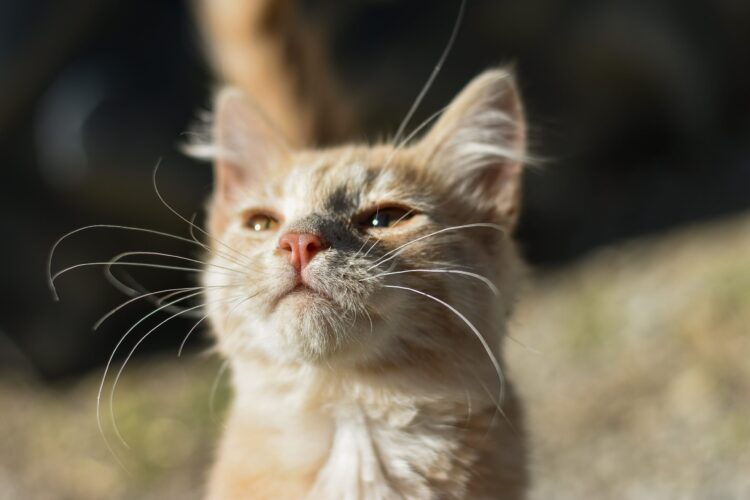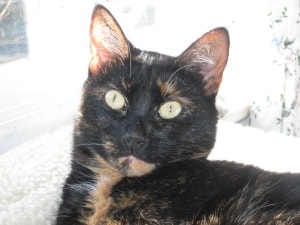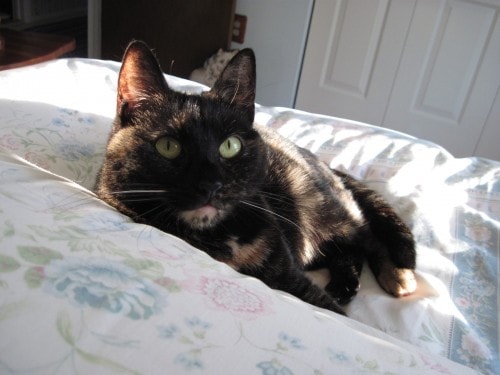
Sometimes I think I probably was a cat in a former life, because among many other things I have in common with the feline species, I’m extremely sensitive to scented products. But the experience of even the most scent-sensitive human doesn’t even come close to how a cat experiences scent.
A cat’s sense of smell is far superior to that of humans. Cats have 45 to 200 million odor-sensitive cells in their noses compared to only five million in humans. A cat’s sense of smell is 14 times better than that of humans. Those facts alone are reason enough to avoid any products with a strong scent in homes shared with cats.
This is especially true for air fresheners. Air fresheners practically make my throat close up, so I can only imagine what they do to cats’ sensitive little noses. But strong scent isn’t the only problem with air fresheners.
Air fresheners can be extremely toxic to cats (and humans)
“If we are putting some kind of chemical into the air merely to mask scents, then we have to be concerned about the negative implications for our pets,” holistic veterinarian Dr. Patrick Mahaney of California told PetMd. One of the main offenders in the ingredient list for most air fresheners are volatile organic compounds (VOC). These chemicals can react with naturally occurring compounds in the air and worsen indoor air quality.
According to a recent Washington Post article, over 75 percent of air fresheners graded by the Environmental Working Group, a Washington-based nonprofit that focuses on research and advocacy, contain either “likely” or “potentially significant” hazards to health or the environment based on concerns posed by exposure to their ingredients.
Exposure to VOC’s can lead to adverse health effects in humans, including migraines, asthma attacks, breathing difficulties and neurological problems. Short-term exposure can even irritate the eyes, throat and nose, as well as cause nausea. Long-term exposure to these compounds in air fresheners and cleaning products can disrupt hormones and cause cancer.
It’s not a big leap to assume that the same concerns apply to cats – probably even more so, given their smaller size! Dr. Mahaney tells PetMD that air fresheners can have detrimental long-term effects on cats: “Cats have had an increase in feline asthma as a result of living in households where there are air fresheners, incense and cigarette smoke—or even just the aroma of cleaning products.”
Natural or “green” alternatives to air fresheners may be toxic as well
Air fresheners with labels such as “organic,” “natural”, or “green” can still omit potentially hazardous chemicals. Researchers from the Natural Resource Defense Counsel found that “even natural products can lead to toxic chemicals.” Even the EPA recommends cutting back on using products with strong fragrances.
Products containing essential oils may be okay for humans, but they can be extremely harmful, even deadly, to cats.
PetMd features a comprehensive article about the dangers of air fresheners around cats. Read How Air Fresheners Can Affect Your Pet’s Health for more information.
Just say no
Your safest bet, for your cat’s and your own health, is to eliminate use of air fresheners (and scented cleaning products) altogether. Keep a clean home, and open your windows regularly to allow in fresh air – a practice I grew up with in Germany, and have kept up with all my life.
Image Pexels stock photo







I am a disabled person living with a mother, cat and kittens in my bedroom. I do not have the ability to scoop the box on my own, but I live with people who can. However, I often have to wait several hours as my cat likes to poop in the middle of the night. I am extremely sensitive to the smell of cat poop and I do not know what to do to mask it. How can I mask it until someone is able to wake up to clean the box? I cannot access my window.
I would recommend a good air purifier – not right next to the litter box, but even if it’s on the opposite side of your room, it’s going to clear odors in a very short time. Best of all, it won’t mask the smell, it’ll just simply clear it from the air.
If my cat is suffering with asthma and is sensitive to fragrances etc. wouldn’t it be dangerous to open my windows? What about the pollution in the air?
Depending on your cat’s asthma or fragrance sensitivity, air pollution may certainly cause symptoms, but air fresheners only add to indoor air pollution. They release toxic chemicals and scents, they don’t clean the air. For that, you need a good air purifier.
My cat was sneezing for months and months. My windows were coated. After I unplugged the air freshener, she stopped.
Thank you for sharing, Melinda. Wow, just think what you and your cat breathed in if your windows were coated!
What about Scentsy wax melts? I had always been told those were safe but now I want to be 100% sure.
Since they contain fragrance oils, I don’t consider them safe for use around cats.
Hi Ingrid,
What about burning incent? I used it when I meditate.Would you let me know.
Thank yudy
Incense can contain VOC’s as well as essential oils – both are harmful to cats. If you’re going to use incense, use in a well-ventilated room away from your cats.
With Tasha having asthma, I don’t use air fresheners of scented candles. For cleaning I use vinegar.
This is an eye opener. Thanks for the advice.
I don’t use anything I just open the windows for fresh air! My kids and myself has problems with smells!
I couldn’t agree more with you Ingrid. Often the scent of the air freshener is worse than the odor that is being covered up. If your environment is clean, there is no need for air fresheners. I open my windows and air my home daily, even in the coldest weather. As you know Ingrid, there is no better smell than a freshly aired room.
What about scented cat litter? I’m using a great one now, but it’s scented and I can’t stand it. I’m thinking of adding baking soda to it to get rid of the scent. It’s a shame, cause it’s the best working litter I’ve used.
I do not recommend scented cat litter. Keep in mind how close to the litter cats’ noses are.
I had no idea that the mildest of scents and especially the natural ones would be an issue. I feel terrible not realizing how sensitive their noses are. Thank you for this information, I’m making sure to change things right now and pass this information on to family and friends.
Yes, I stopped years ago, I gave all of my essential oils and scented candles away. No sprays, nothing. They are bad for dogs but much worse for cats. However, you can’t convince some people of anything. I have regular ones in case of losing electricity and the memorial candles, Yahrzeit .